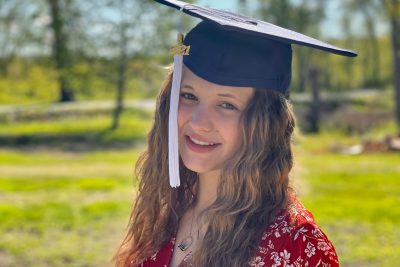
Editor’s Note: The following essay, penned by Neag School alumna and first-year teacher D’Lanie Pelletier ’20 (ED), ’21 MA, was originally published in the Spring 2021 newsletter of the Connecticut Council of Language Teachers. Here, Pelletier reflects on her experience as a first-year educator, teaching during COVID.
Throughout my teacher preparation program at UConn’s Neag School of Education, I always knew that my first year of teaching would be challenging. However, I never could have imagined the challenges that the year 2020-2021 has brought. This year has brought students in masks with shields over their desks, hybrid learning, block schedules, fully online students, and the struggle to keep students engaged despite the uncertainty of their outside world. All of the teaching and classroom management strategies that I learned in my teacher preparation program now seemed distant as all teachers learned how to adapt and teach in this new learning model.
Although this year was far from what I expected, I have learned and grown a lot since the first day. I went into the first week nervous and unsure of how the lessons were going to unfold. Through many trials and errors, I have found new ways to connect with and engage my students, some of whom I have never even met in person. Applications such as Nearpod, Edpuzzle, Kahoot!, and Quizlet Live have become an integral part of my lessons. I have found that these apps keep the students, whether at home or in person, engaged and participating in the classwork.
“Although this year was far from what I expected, I have learned and grown a lot since the first day.”
Another quality that I have learned in my first year is patience and compassion. Just as many adults are tired and struggling this year, our students are feeling this same way. They are behind screens all day and are unable to hang out with their friends as they could years before. Sometimes as teachers, we forget that our students can feel the same burnout and exhaustion that we feel. I learned that being patient with students and showing them that you understand can go a long way. The students have been more than patient with us teachers trying to figure out the new technology, so we owe it to them to be patient as well.
I spoke about being patient with students, but something that was much harder for me to learn this year was how to be patient with myself. As a first-year teacher, I often feel as if I have to prove myself. I want to prove to my students, colleagues, and the administration that I am capable of this job. However, this led to a massive amount of overthinking and stress that wasn’t good for me or my students’ learning. I had to see that it is OK to make mistakes. As a first-year, it is expected. These mistakes are what help you learn. The students don’t expect you to be perfect, just as you don’t expect them to be. I also had to learn that it is not a weakness to ask for help. Asking for input on a lesson or activity will simply just make it better. The more perspectives that you have, the better the lessons will be.
“Pandemic or not, our students need to learn, and it’s our responsibility to be there for them through it all.”
Although I wish that teaching could go back to “normal,” I am grateful for all of the lessons that I have learned this year. It has allowed me to reflect as an educator as to why I chose to be a teacher, and how I will best serve my students moving forward. Pandemic or not, our students need to learn, and it’s our responsibility to be there for them through it all.
D’Lanie Pelletier ’20 (ED), ’21 MA graduated in world languages from Neag School of Education’s Integrated Bachelor’s/Master’s Teacher Education Program. She did her student teaching during her master’s year at her alma mater, E.O. Smith High School in Mansfield, Connecticut, and will be teaching French there in the fall.
 Facebook
Facebook
 Twitter
Twitter
 LinkedIn
LinkedIn
